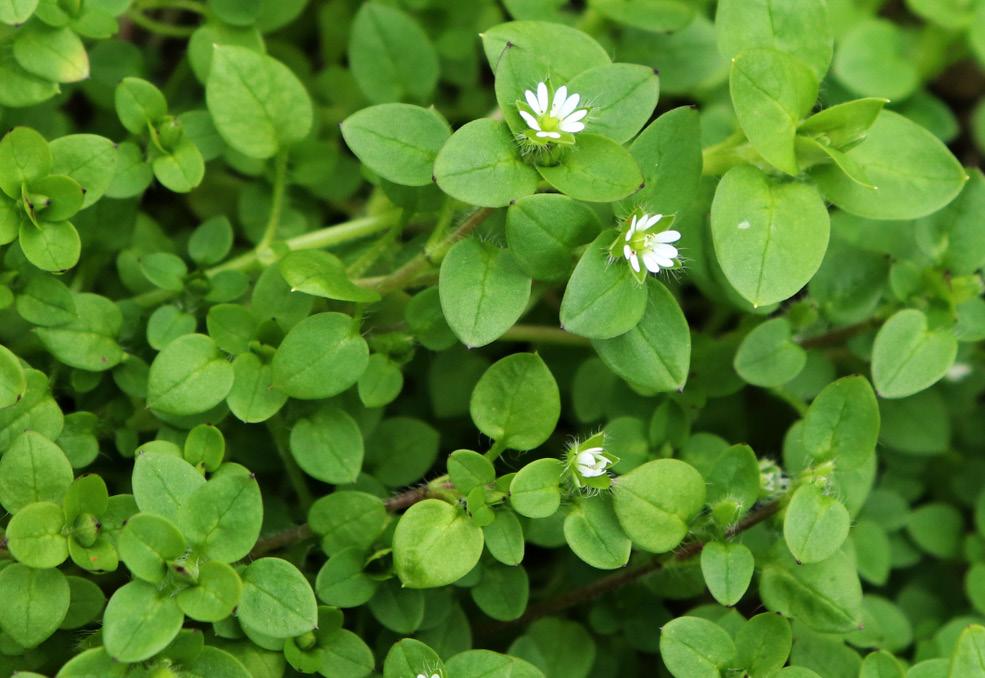Flurry ™
Translocated herbicide for the control of chickweed, dock, nettles and brambles in newly sown and established grassland.
Active Ingredients: 200g fluroxypyr
• Powerful, single active herbicide for controlling a range of problem weeds.
• Reduces weed competition to improve your grass yields and silage quality.
• Great choice for overall sprays in both newly sown leys or established grassland.
EC Formulation Emulsifiable concentrate
• A good option for chickweed control, to ensure quick establishment of new swards.
• Compliments our range of other grassland herbicides.
• Added assurance of Clayton’s trusted products and premium service.
CLAYTON FLURRY
ANNUAL WEEDS CLAYTON FLURRY
Black bindweed 6
Bristly ox-tongue
Charlock
Chickweed Flowering
Cleavers Flowering
Corn chamomile
Corn marigold
Cranesbill
Dead-nettle 4TL
Fat-hen
Fool’s parsley
Forget-me-not Flowering
Fumitory 2TL
Groundsel 2TL
Hemp-nettle Flowering
Himalayan balsam
Knotgrass
Mayweeds
Nettle (small)
Black nightshade
Orache
Pale persicaria
Poppy
Redshank
Scarlett pimpernell
Shepherd’s purse
Speedwells
Spurrey
Wild radish
Yellow rattle (TL = True leaf, maximum size of weed controlled)
RATES
GUIDE KEY
IMPORTANT: The above weed susceptibility table and weed control ratings are based on various information sources including label reference, farm experience, anecdotal and limited data and trials reference. The weed susceptibility table is for guidance only and is not a recommendation. As such use of the products listed for control of non-label weeds is the sole responsibility of the user.
Clayton Flurry contains fluroxypyr, a translocated herbicide taken up by the leaves. It is essential that the target weeds have fully emerged before application and that good spray cover of the weed foliage is achieved when weeds are small and actively growing under warm moist conditions.
Ensure grass is vigorous with growth unaffected by frost, pests, disease, nutrient deficiency or moisture stress before treatment. Do not treat waterlogged grassland or grassland under drought stress.
Did you know? Nettles as a perennial weed can grow from both seed or root portions so are very invasive and occupy valuable pasture as they grow; poached areas, bare soil, field margins or open swards are ideal areas where nettles will establish.
Chickweed is the most widespread, common annual weed of grassland. It’s very rapid growth means it competes strongly with grass leading to significant yield losses especially when establishing new grass leys or reseeds.
TARGET WEEDS (ON-LABEL)
Crop
Established Grassland
Newly Sown Grass Leys
Other annual weeds
Weeds controlled
Common nettle, Pre-flowering broad-leaved dock, Bramble, Broom.
Common chickweed
Black bindweed (6TL), Cleavers (Flowering), Dead-nettle (4TL), Forget-me-not (Flowering), Fumitory (2TL), Groundsel (2TL), Hemp-nettle (Flowering), Knotgrass (2TL), Mayweeds (2TL), Pale persicaria (2TL), Redshank (2TL), Speedwells (2TL) (Good control).
USE RATE & TIMINGS
ESTABLISHED GRASSLAND
Maximum Individual Dose: 2.0 litres product per hectare
Maximum Total Dose: 2.0 litres product/hectare/ annum
NEWLY SOWN GRASS LEYS
Maximum Individual Dose: 0.75 litres product per hectare
Maximum Total Dose: 0.75 litres product/ hectare/annum
GRAZING INTERVAL
Exclude livestock during treatment and do not allow livestock to graze treated grassland for at least 7 days following treatment.
Where ragwort is present, users should consult the Code of Practice on How To Prevent The Spread Of Ragwort. Ragwort plants sprayed with this herbicide are more palatable with higher levels of toxins.
Animals should be excluded from treated areas until any ragwort has completely recovered or died and there is no visual sign of the dead weed.
Do not include any treated ragwort in hay or silage crops.
MORE INFORMATION
For further information on Clayton Flurry, please refer to the product label and for information on compatibility tank mixes, please contact us at info@claytonpp.com
More Information
*Information

